Tuesday, November 30, 2010
Interval
"Look," the guy says, "you're going to think I'm crazy, but after twenty-nine years I just remembered, I brought a pair of brown oxfords here twenty-nine years ago to be resoled, and then forgot to pick them up. I don't suppose there's any chance that you have them?"
Without batting an eye the shoemaker goes to the back room, and he's gone a long time. But then he comes back and tells the guy, "Sure, I still got 'em." The guy's so tickled he can hardly contain himself. What glorious karma, for them to be still there. "Great," he says, "can I have them?" The shoemaker thinks for a moment. then, "Sure you can have 'em. They'll be ready Thursday afternoon."
Something Borrowed
Monday, November 29, 2010
Sauce
Today spaghetti sauce with sausage. With plenty of oregano and capers. Black olives if I have them. Red wine, which I do have. Sauté onions and carrots. Brown sausage meat out of the skin. Canned tomatoes, tomato sauce. I haven't cut an onion yet, or browned a sausage, but I smell the sauce.
Today, poetry sauce is Sir Walter Ralegh's translation of Aeneid, vi,724-7, in Raleigh's History of the world:
The heauen, the earth, and all the liquid mayne,
The Moones bright Globe, and Starres Titanian,
A spirit which through each part infus'd doth passe.
Fashions, and workes, and wholly doth transpierce
All this great body of the Vniuerse.
Sunday, November 28, 2010
China
Now, through a series of karmic coincidences, I am excited to be working with the manuscript again.
Friday, November 26, 2010
Day after Thanksgiving
Two of my three children were the red. So good simply to enjoy them. And my grandson, now almost eleven, who holds a very big warm place in my life. How could I not be thankful, basking in the warmth of a peaceful family.
Thursday, November 25, 2010
How about this -- opening poem in Jerry Rothenberg's Cincealments & Caprichos
for Clayton Eshelman
Words imprinted on a sign
by Goya glowing
white against a surface
nearly white:
"the sleep of reason
that produces monsters."
He is sitting on a chair
his head slumped
resting on his arms
or on the marble table,
pencil set aside,
his night coat open
thighs exposed.
All things that fly at night
fly past him.Wings that brush an ear,
an ear concealed,
a memory beginning
in the house of sleep.
His is a world where owls
live in palm trees,
where a shadow in the sky
is like a magpie,
white & black are colors
only in the mind,
the cat you didn't murder
springs to life,
a whistle whirling in a cup,
gone & foregone,
a chasm bright with eyes.
There is a cave in Spain,
a feral underworld,
where bats are swarming
among bulls,
the blackness ending in a wall
his hands rub up against, a blind man in a painted world,
amok and monstrous
banging on a rock.
Nuthin' Much
Now that I'm beginning to grow up at the age of 80, I find that I have a gift of gratitude that often enough shapes my days. No point listing all that I have to be grateful for including family, which I didn't properly value in the past. And also the grace of awakening each morning with the feeling that I can help make the day interesting and loving.
Wednesday, November 24, 2010
a herring
Two old friends, out of the same shtetl, met a couple of times a week for tea in Manhattan, always the same time, same place. Sp they're sitting there, as they always did, staring into their tea cups because everything they had to talk about they'd already talked about. Finally, one of them looks up, still a little dreamy from the tea steam but rising on the wings of an idea. "Okay, Shimel" he says, "wot's green and you hang it on the vall and it vistles."
Shimel is still mostly in his tea cup, but slowly he raises his head, half dazed, half quzzical, and says, "Green, you hang it on the vall and it vistles? How should I know because there's no such thing. C'mon, you tell me." So Chaim, the first man, replies, "A herring." Shimel's astonished. ""A herring?! A herring is green?" Chaim says, so you pain it green." "Okay, okay, a herring, a herring hangs on the vall?" Chaim, simply, "So you hang it on the vall?" Now Shimel is getting exasperated. "So now you gung tell me a herring vistles?!" Chaim lets the moment hang, then, "So it doesn't visel."
Stone Soup
Last night, with a class of men on probation out of Dorchester District Court, I took part in a remarkable discussion of the Tolstoy story, "Korney Vasielevitch." The story is about a rich man hungry for more, who, returning from a business trip, finds that his wife has been cheating on him. Under real provocation by her taunts, he falls into a rage, beats her savagely, and also permanently cripples the arm of their young daughter when she stands between him and his wife. Korney leaves the house the next morning and for seventeen years wanders deeper and deeper into denigration. At the end of that time, a drunken tram still driven by rage against his wife, he returns home. What follows is a drama of forgiveness that contains a range of moral subtleties not easily resolved.
The men were magnificent, not only interpreting and asking just the right questions, but also seeing the analogies to their own lives. One of the subjects that came up is whether everyone has a core of goodness, no matter how veiled. For eight weeks, through the course, the men have been rediscovering their own goodness, and it was a remarkable occasion to feel how much that discovery was in the air.

